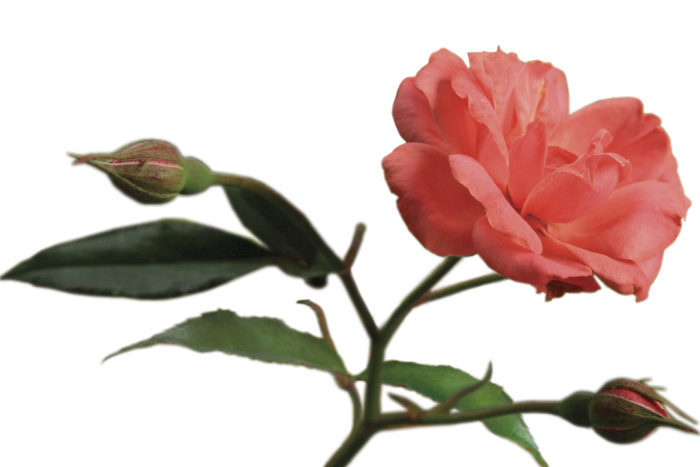
Mention the word “rose” and most gardeners instantly think of fussy plants needing constant coddling, chemical treatments, and a completely separate area of the garden. If you like the formal separation and high maintenance, great. But I like to mix roses throughout my garden beds and leave them alone to mingle with other plants. I know it’s a shock to say it, but a rose is just a shrub with flowers on it and doesn’t need pampering to be pretty. It is important, however, to select the right kind of rose for your garden. Roses are bred for two distinct uses: for the garden or for the cut-flower industry. Roses for the latter are meant to be grown in climate-controlled greenhouses, where disease pressures are limited; if you try to grow them any other way, you’ll be frustrated. So what you want are garden roses. They are bred to be grown outdoors among your other plants. There are thousands of beautiful and easy-to-grow varieties available. By planting the right rose in healthy, living soil, you can have gorgeous blooms and can eliminate tedious special tending treatment. Who knew roses could be so simple?
Soil improvement is worth your time; watering isn’t
Caring for roses naturally isn’t difficult. It’s about combining a few simple elements to create a naturally healthy environment. The most important part is the soil. Roses, like all plants, thrive in living soil because of the symbiosis between the plant and beneficial mycorrhizae. This fungal relationship acts like extensions to the plant roots, drawing in water and nutrients for the host. To create living soil, add organic material to new beds and top with mulch or compost. For existing beds, simply top them with compost or mulch and do not disturb the existing soil or remove old mulch. Sustaining a living-soil environment is also simple. Just continue to add an inch or two of organic matter, like compost or mulch, on top every year in late winter or early spring when you prune. I also often apply another layer in summer. Never rake out old mulch; let it decompose, and put the new stuff right over it. I recommend using a hardwood mulch for roses because I’ve found that it also helps suppress diseases.
4 ways to keep your roses care-freeYour roses’ natural defenses can be strengthened with just a little boost from you. These simple practices will encourage your plants to be more drought tolerant and disease resistant. 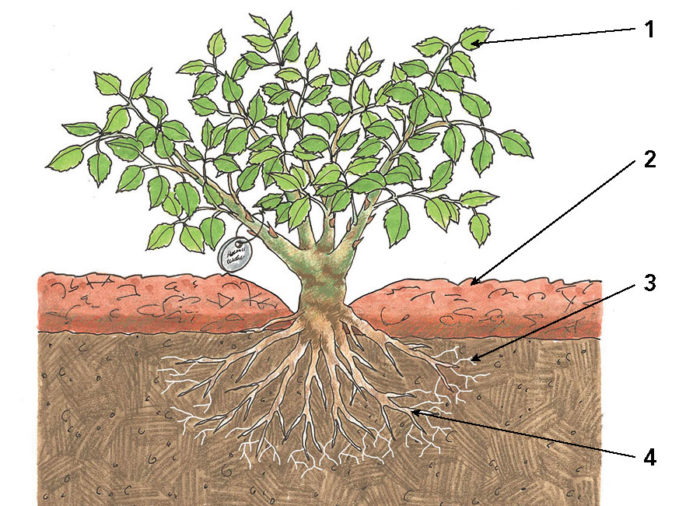 1. Keep beneficial fungi on the leaves. Refrain from using synthetic fungicides that kill the good fungi along with the bad. 2. Add 1 to 2 inches of new mulch every year. The best time to apply a fresh layer is in late winter or early spring when you also plan to prune your roses. 3. Allow beneficial mycorrhizae to establish. This fungal relationship acts as beneficial root extensions that actually bring water to the plants. Encourage this by layering new organic matter on top of the old layer, rather than working it into the soil. 4. Water deeply but infrequently. This encourages deep root systems to develop, which help roses withstand periods without water. |
The less-is-more approach also applies to watering. Roses watered less push their roots deeper, helping protect them against weather and moisture fluctuations. I water my roses during the first year to get them established and then I stop. The roses in my home garden have not been watered in more than eight years, and at the nursery, we stopped outside irrigation two years ago—except when we are taking cuttings. During the last two years, we’ve had a record drought, and my roses have gone as long as two months without water. They survived because their roots are deep into the soil, and the mycorrhizae in our living soil help bring water to the plant.
I’m not saying everyone will be able to go completely without watering, particularly those with sandy soils or who live in areas with little rainfall. Here’s a simple test: Cut off all irrigation, noting the day. Watch your roses—when they begin to droop, you’ve waited one day too long. Count back to when you last watered and you’ll know how often you need to water. Over time, you will need to water even less because your roses will continue to push their roots deeper into the soil.
Cut off the chemicals
Like an antibiotic you take for an infection, most synthetic fertilizers, insecticides, and fungicides are quick-fix solutions and do little to promote your roses’ long-term ability to take care of themselves; in fact, they actually weaken a rose’s own defenses. Roses, like many plants, have beneficial fungi on their leaves to help them combat disease. Synthetic fungicides do not discriminate between beneficial and harmful fungi. When synthetic fungicides are used repeatedly, the beneficial fungi are reduced and can become ineffective. If that happens, roses become completely dependent on synthetic fungicides.
Natural alternatives, like Peter Beales Good Health Roses program, promote your plants’ immune systems, helping them ward off disease on their own over a long period of time. These natural defenses are particularly important when you take into account that diseases continually mutate to become resistant to synthetic chemicals; this is not as likely with nature’s own defenses.
There is a growing consensus that good garden roses grown naturally will, over time, become more immune to diseases. If you have children, you know what I mean. When your children are young, they catch every cold and flu around. Being exposed to the various strains makes them eventually more immune. In my experience, it’s the same with roses.
How to kick the chemical habitThe best way to quit using synthetic fungicides and pesticides is to quit cold turkey. When you decide to stop coddling your roses, dispose of all your unused chemicals responsibly and give your roses time to adapt. Keep in mind that it could take your plants a full season to recover from the absence of chemicals and for their natural defenses to begin to work fully. You might see a short-term decline in your roses, so remember the goal: long-term health. If you can’t tolerate them temporarily looking sad, I recommend using a naturally derived oil, soap, or spray designed to treat the specific condition. These products reduce the problematic pests and diseases while sparing the beneficial insects and the plants’ natural defense systems. For proper chemical disposal, contact your county’s solid-waste department, call 800-CLEANUP, or visit epa.gov. |
Learn to live with some damage to your roses. Very little in nature is perfect, so why should roses have to be? I live with some insect damage or the occasional minor outbreak of black spot every now and then. To me, it’s just part of gardening and a minor trade-off for all the butterflies, honeybees, and songbirds the plants attract. Even the best-laid plans can go awry, however, so if a severe outbreak occurs, action may be required. There are plenty of effective natural products on the market. In the long run, you will be rewarded with naturally beautiful, environmentally friendly roses that need less care. Who knows? You might actually have time to stop and smell them.
5 Stunning & Strong Garden Roses
 |
 |
 |
‘Too Cute’ rose (Rosa ‘Too Cute’, USDA Hardiness Zones 5–9)Enjoy full pink blooms on compact growth all season long. It’s disease resistant and will tolerate a shady location in your garden. |
‘American Pillar’ rose (Rosa ‘American Pillar’, Zones 5–9)This is a classic rose with large hot pink to red blooms with a white center. At up to 20 feet tall, it’s a stunning giant climber, which makes a great lush, glossy backdrop for other plantings. |
‘Fair Eva’ rose (Rosa ‘Fair Eva’, Zones 5–9)
A lovely yet sturdy little rose, it always has a flush of booms—plus, it’s disease resistant. Add it to hanging baskets, or allow it to sprawl on the ground. |
 |
 |
‘Purezza’ rose (Rosa ‘Purezza’, Zones 7–9)White blooms cover this thornless climber. It’s perfect for an arbor, for a low fence, or as a standing shrub. |
‘White Pearl in Red Dragon’s Mouth’ rose (Rosa ‘White Pearl in Red Dragon’s Mouth’, Zones 7–9)Small and showy, this rose is rarely without flowers during the growing season. It’s great for containers, for mass plantings, or as a low hedge. |
Paul Zimmerman, owner of Paul Zimmerman Roses in Landrum, South Carolina, practices what he preaches by growing thousands of roses naturally.
Photos, except where noted: courtesy of Paul Zimmerman


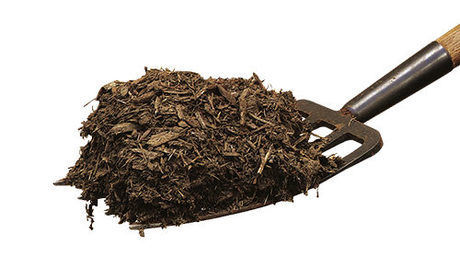
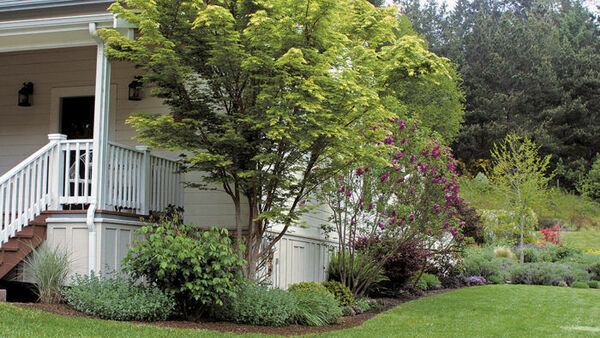

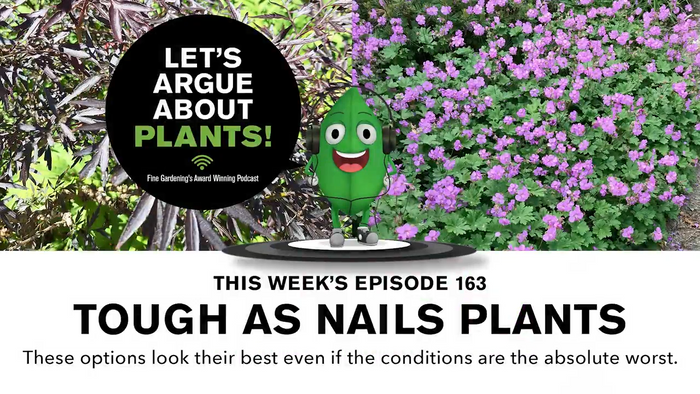
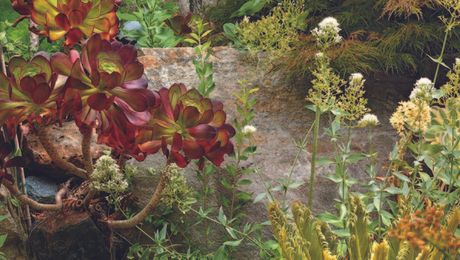
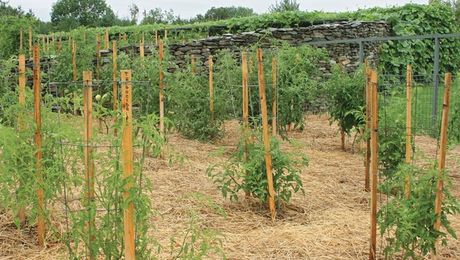









Comments
Log in or create an account to post a comment.
Sign up Log in